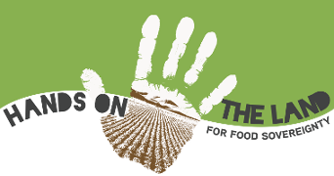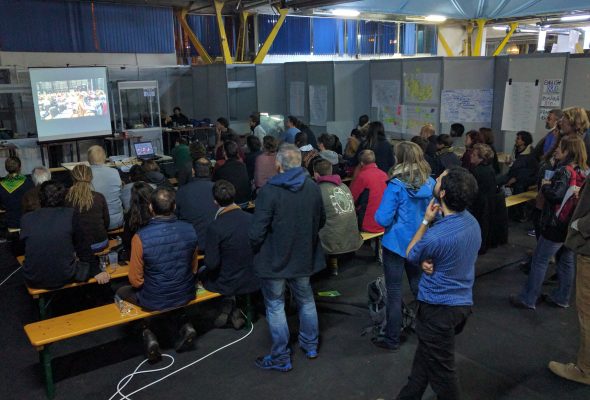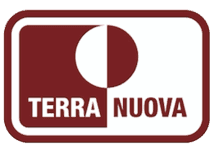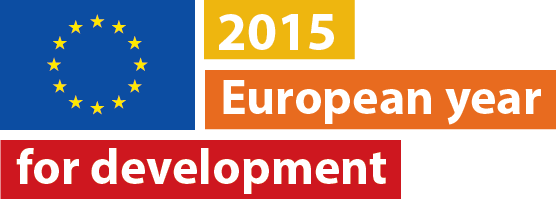One of the open spaces at the Nyéléni Europe Forum on Saturday evening was dedicated to a presentation of the People’s Manual on the Tenure Guidelines and the screening of a short video by the Hands on the Land Alliance.
Download and spread the People’s Manual
Strongly embedded in existing human rights law, the Voluntary Guidelines on the Tenure of Land, Fisheries and Forests (or simply ‘Tenure Guidelines’) were adopted in 2012 by the Committee on World Food Security (CFS) at the FAO, following long negotiations and strong pressure from civil society and social movements. The People’s Manual was developed to translate the policy language in practical language for peoples that want to use them on the ground. It highlights parts of the guidelines that offer answers to their needs and provides advice on mechanisms, strategies and actions that can be adopted to generate dialogue and to defend human rights and social justice. The manual is the result of collective and participatory work undertaken by the Land and Territory Working Group of the International Planning Committee for Food Sovereignty.
Importance of the guidelines for social movements worldwide
“Now that the Tenure Guidelines have been adopted, we have to make sure they are implemented in the right way, and not captured by corporate interests,” explains Mauro Conti from Crocevia, one of the members of the Hands of the Land Alliance. “That’s why the People’s Manual was developed; it is meant to train small scale producers, farmers, fishers and indigenous peoples.”
Why are the Tenure Guidelines and this manual so important for social movements? “We need to come together to protect ourselves against land grabbing,” says Massa Koné from Mali. “The guidelines have given impetus to our movement and we have managed to come to an agreement with the Malian government on better policies. But now we need to act on them, implement them and make them part of our daily lives.”
Mohamed Conteh from the Sierra Leone Network for the Right to Food also expressed his concerns about the implementation of the guidelines. “Besides technical consultations in the capital by the FAO, nothing has happened on the ground. We need to need to popularise them and have them enshrined in our national laws.”
Not only for land struggles in the Global South
As pointed out by speakers from Turkey, Sweden en Romania, the Peoples Manual is not only a document to be used in the Global South. Attila Szocs from the Romanian peasant organisation Eco Ruralis: “For us this is a benchmarking publication. I’m happy to see the Peoples Manual, because its written in a language that we peasants understand. We will definitely use it to familiarise our members with the Tenure Guidelines and in our advocacy towards the Romanian government.”
Film screening
The film that was screened is also available online. In it, frontline communities and social movements around the world explain why we need to keep our hands on the land for food sovereignty and climate justice. They talk about the false solutions they are presented with against climate change, and the real solutions and ways forward that small-scale food producers promote.
More information:
www.foodsovereignty.org
www.handsontheland.net














 This campaign is financially supported by the European Commission. The views expressed herein are not of the EC.
This campaign is financially supported by the European Commission. The views expressed herein are not of the EC.